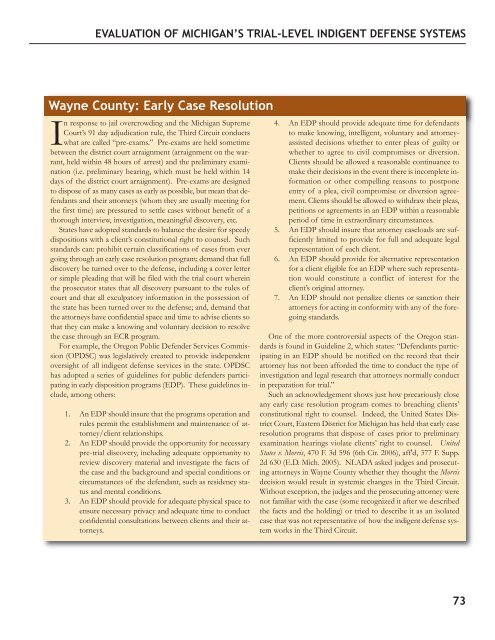Evaluation of Trial-Level Indigent Defense Systems in Michigan
Evaluation of Trial-Level Indigent Defense Systems in Michigan
Evaluation of Trial-Level Indigent Defense Systems in Michigan
Create successful ePaper yourself
Turn your PDF publications into a flip-book with our unique Google optimized e-Paper software.
EVALUATION OF MICHIGAN’S TRIAL-LEVEL INDIGENT DEFENSE SYSTEMS<br />
Wayne County: Early Case Resolution<br />
In response to jail overcrowd<strong>in</strong>g and the <strong>Michigan</strong> Supreme<br />
Court’s 91 day adjudication rule, the Third Circuit conducts<br />
what are called “pre-exams.” Pre-exams are held sometime<br />
between the district court arraignment (arraignment on the warrant,<br />
held with<strong>in</strong> 48 hours <strong>of</strong> arrest) and the prelim<strong>in</strong>ary exam<strong>in</strong>ation<br />
(i.e. prelim<strong>in</strong>ary hear<strong>in</strong>g, which must be held with<strong>in</strong> 14<br />
days <strong>of</strong> the district court arraignment). Pre-exams are designed<br />
to dispose <strong>of</strong> as many cases as early as possible, but mean that defendants<br />
and their attorneys (whom they are usually meet<strong>in</strong>g for<br />
the first time) are pressured to settle cases without benefit <strong>of</strong> a<br />
thorough <strong>in</strong>terview, <strong>in</strong>vestigation, mean<strong>in</strong>gful discovery, etc.<br />
States have adopted standards to balance the desire for speedy<br />
dispositions with a client’s constitutional right to counsel. Such<br />
standards can: prohibit certa<strong>in</strong> classifications <strong>of</strong> cases from ever<br />
go<strong>in</strong>g through an early case resolution program; demand that full<br />
discovery be turned over to the defense, <strong>in</strong>clud<strong>in</strong>g a cover letter<br />
or simple plead<strong>in</strong>g that will be filed with the trial court where<strong>in</strong><br />
the prosecutor states that all discovery pursuant to the rules <strong>of</strong><br />
court and that all exculpatory <strong>in</strong>formation <strong>in</strong> the possession <strong>of</strong><br />
the state has been turned over to the defense; and, demand that<br />
the attorneys have confidential space and time to advise clients so<br />
that they can make a know<strong>in</strong>g and voluntary decision to resolve<br />
the case through an ECR program.<br />
For example, the Oregon Public Defender Services Commission<br />
(OPDSC) was legislatively created to provide <strong>in</strong>dependent<br />
oversight <strong>of</strong> all <strong>in</strong>digent defense services <strong>in</strong> the state. OPDSC<br />
has adopted a series <strong>of</strong> guidel<strong>in</strong>es for public defenders participat<strong>in</strong>g<br />
<strong>in</strong> early disposition programs (EDP). These guidel<strong>in</strong>es <strong>in</strong>clude,<br />
among others:<br />
1. An EDP should <strong>in</strong>sure that the programs operation and<br />
rules permit the establishment and ma<strong>in</strong>tenance <strong>of</strong> attorney/client<br />
relationships.<br />
2. An EDP should provide the opportunity for necessary<br />
pre-trial discovery, <strong>in</strong>clud<strong>in</strong>g adequate opportunity to<br />
review discovery material and <strong>in</strong>vestigate the facts <strong>of</strong><br />
the case and the background and special conditions or<br />
circumstances <strong>of</strong> the defendant, such as residency status<br />
and mental conditions.<br />
3. An EDP should provide for adequate physical space to<br />
ensure necessary privacy and adequate time to conduct<br />
confidential consultations between clients and their attorneys.<br />
4. An EDP should provide adequate time for defendants<br />
to make know<strong>in</strong>g, <strong>in</strong>telligent, voluntary and attorneyassisted<br />
decisions whether to enter pleas <strong>of</strong> guilty or<br />
whether to agree to civil compromises or diversion.<br />
Clients should be allowed a reasonable cont<strong>in</strong>uance to<br />
make their decisions <strong>in</strong> the event there is <strong>in</strong>complete <strong>in</strong>formation<br />
or other compell<strong>in</strong>g reasons to postpone<br />
entry <strong>of</strong> a plea, civil compromise or diversion agreement.<br />
Clients should be allowed to withdraw their pleas,<br />
petitions or agreements <strong>in</strong> an EDP with<strong>in</strong> a reasonable<br />
period <strong>of</strong> time <strong>in</strong> extraord<strong>in</strong>ary circumstances.<br />
5. An EDP should <strong>in</strong>sure that attorney caseloads are sufficiently<br />
limited to provide for full and adequate legal<br />
representation <strong>of</strong> each client.<br />
6. An EDP should provide for alternative representation<br />
for a client eligible for an EDP where such representation<br />
would constitute a conflict <strong>of</strong> <strong>in</strong>terest for the<br />
client’s orig<strong>in</strong>al attorney.<br />
7. An EDP should not penalize clients or sanction their<br />
attorneys for act<strong>in</strong>g <strong>in</strong> conformity with any <strong>of</strong> the forego<strong>in</strong>g<br />
standards.<br />
One <strong>of</strong> the more controversial aspects <strong>of</strong> the Oregon standards<br />
is found <strong>in</strong> Guidel<strong>in</strong>e 2, which states: “Defendants participat<strong>in</strong>g<br />
<strong>in</strong> an EDP should be notified on the record that their<br />
attorney has not been afforded the time to conduct the type <strong>of</strong><br />
<strong>in</strong>vestigation and legal research that attorneys normally conduct<br />
<strong>in</strong> preparation for trial.”<br />
Such an acknowledgement shows just how precariously close<br />
any early case resolution program comes to breach<strong>in</strong>g clients’<br />
constitutional right to counsel. Indeed, the United States District<br />
Court, Eastern District for <strong>Michigan</strong> has held that early case<br />
resolution programs that dispose <strong>of</strong> cases prior to prelim<strong>in</strong>ary<br />
exam<strong>in</strong>ation hear<strong>in</strong>gs violate clients’ right to counsel. United<br />
States v. Morris, 470 F. 3d 596 (6th Cir. 2006), aff'd, 377 F. Supp.<br />
2d 630 (E.D. Mich. 2005). NLADA asked judges and prosecut<strong>in</strong>g<br />
attorneys <strong>in</strong> Wayne County whether they thought the Morris<br />
decision would result <strong>in</strong> systemic changes <strong>in</strong> the Third Circuit.<br />
Without exception, the judges and the prosecut<strong>in</strong>g attorney were<br />
not familiar with the case (some recognized it after we described<br />
the facts and the hold<strong>in</strong>g) or tried to describe it as an isolated<br />
case that was not representative <strong>of</strong> how the <strong>in</strong>digent defense system<br />
works <strong>in</strong> the Third Circuit.<br />
73



